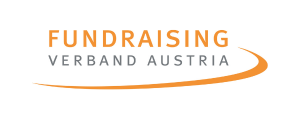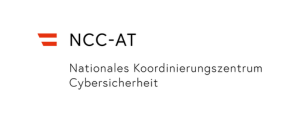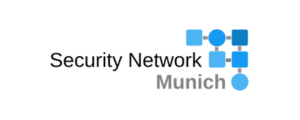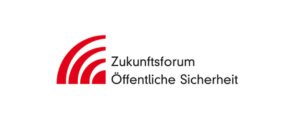Books
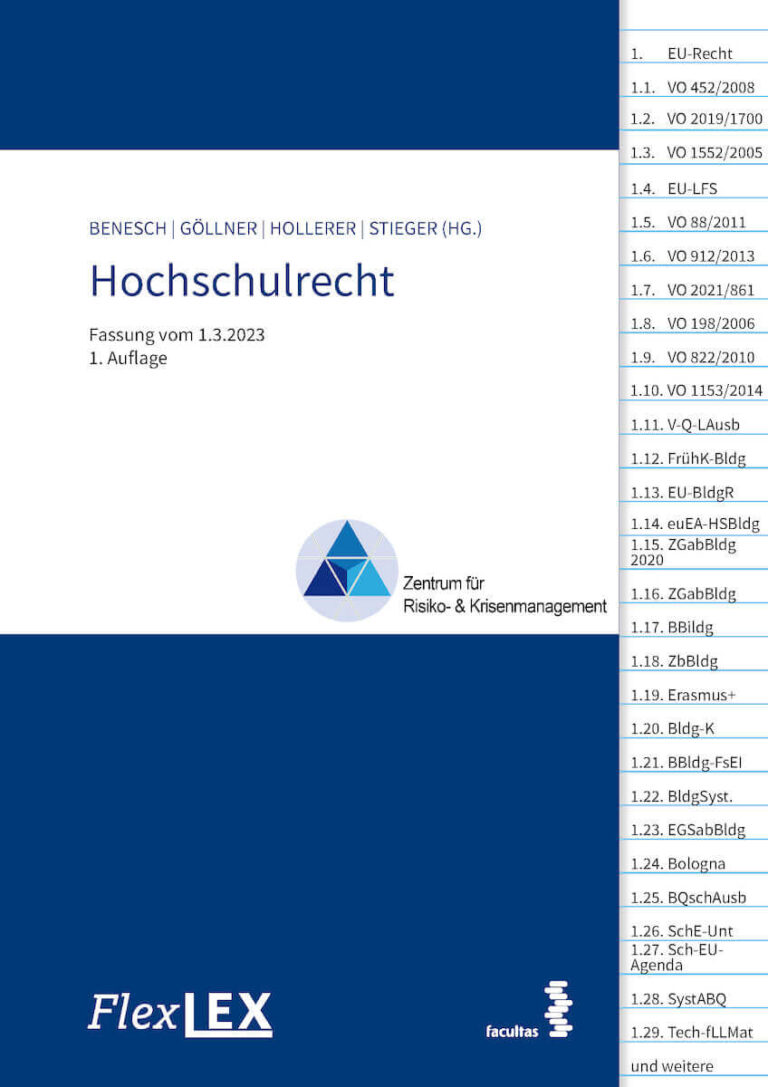
HIGH SCHOOL LAW
facultas / FlexLex, 2023
ISBN: 978-3-99071-244-3
Authors: Thomas Benesch, Johannes Göllner, Franz Hollerer, Martin Stieger
Description
Higher education law contains legal texts on international legal texts, regulations and directives of the European Union as well as laws and regulations of the Republic of Austria on the most important school systems existing in Austria and existing tertiary higher education institutions. For example, organizational, study and employment law aspects are dealt with.
The quantity and quality of educational opportunities play a central role in the development of the state. A high level of education ensures the successful future and international competitiveness of a state.
According to Article 26 of the Universal Declaration of Human Rights, education is a human right.
“1. everyone has the right to education. Education shall be free of charge, at least primary education and basic education. Primary education shall be compulsory. Technical and vocational education must be made generally available, and higher education must be equally accessible to all according to ability.
2. Education shall be directed to the full development of the human personality and to the strengthening of respect for human rights and fundamental freedoms. It must contribute to understanding, tolerance and friendship among all nations and all racial or religious groups and be conducive to the activities of the United Nations for the maintenance of peace.
3. Parents have a paramount right to choose the type of education to be provided to their children.”
In order to uphold this right in Austria and realize it in the best possible way, there are international and national sources of legislation, which are listed in the following sections. The European and national laws as well as important regulations are arranged in a comprehensible and logical order and provide support for people who work in education or are interested in the education system.
Further information and ordering under this link.

BUSINESS MEDIATION
facultas / FlexLex, 2022
ISBN: 978-3-99071-227-6
Authors: Johann Höfler, Marin Stieger, Johannes Göllner
Description
This collection of laws is subdivided as follows:
- Links to and selected regulations and directives of the European Union
- Laws and ordinances of the Republic of Austria
- Other matters corresponding to business mediation
More information
The collection of laws contains the following laws:
European law
1. directive 2008/52/EC on certain aspects of mediation in civil and commercial matters
2. directive 2013/11/EU on alternative dispute resolution for consumer disputes
3. Regulation (EU) 524/2013 on online dispute resolution for consumer disputes
Federal Constitutional Law
4. Federal Constitutional Law (excerpt: Art. 12)
National laws
5. Civil Law Mediation Act
6. EU Mediation Act
7. Alternative Dispute Resolution Act
8. Consumer Protection Act (excerpt: § 28a)
9. Environmental Impact Assessment Act (excerpt: §§ 16, 24a)
10. Energy Infrastructure Act (excerpt: Section 13)
Further information and ordering under this link.
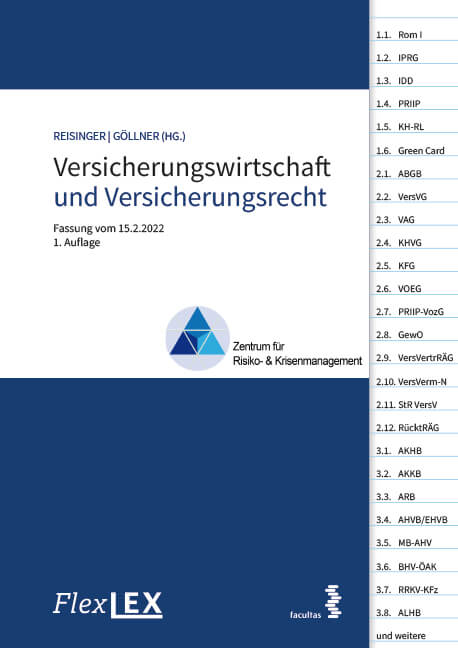
INSURANCE ECONOMY and INSURANCE LAW
facultas / FlexLex, 2022
ISBN: 978-3-99071-206-1
Authors: Wolfgang Reisinger, Johannes Göllner
Description
This collection of laws is intended to provide an overview of the complexity of the insurance industry and insurance law for all those involved in business life in Austria, both in practice and academia, as well as for trainees.
More information
The collection of laws contains the following laws:
1. International insurance law
1.1. ROM I – VO (EG) 593/2008
1.2. Federal Act on Private International Law
1.3. Insurance distribution – Directive (EU) 2016/97
1.4. Regulation (EU) 1286/2014 on key information documents for packaged retail and insurance-based investment products (online)
1.5. Directive 2009/103/EC relating to insurance against civil liability in respect of the use of motor vehicles and the enforcement of the obligation to insure against such liability
1.6. Internal Regulations (Grune-Karte Agreement)
2. National insurance law
2.1. General Civil Code (excerpt)
2.2. Insurance Contract Act
2.3. Insurance Supervision Act 2016
2.4. Motor Vehicle Liability Insurance Act 1994
2.5. Motor Vehicle Act 1967 (excerpt)
2.6. Traffic Victims Compensation Act
2.7. PRIIP Enforcement Act
2.8. Trade Regulations 1994 (excerpt)
2.9. Insurance Distribution Law Amendment Act 2018
2.10. Insurance mediation amendment 2018
2.11. Code of conduct for insurance brokers
2.12. Withdrawal Act (online)
3. Model terms and conditions of the insurance association
3.1. General conditions for motor vehicle liability insurance
3.2. General conditions for motor vehicle own-damage insurance
3.3. General conditions for legal protection insurance
3.4. General and Supplementary General Terms and Conditions for Liability Insurance
3.5. Model terms and conditions for liability insurance for master builders 2013
3.6. Liability framework agreement for the Medical Association 2011
3.7. Liability recall cost insurance for automotive parts suppliers 2017
3.8. General conditions for the liability insurance of aircraft
3.9. Environmental remediation cost insurance
3.10. General conditions for property insurance
3.11. General conditions for the insurance of additional risks to property insurance
3.12. General terms and conditions for BU insurance of additional risks
3.13. General conditions for construction insurance
3.14. General conditions for cyber risk insurance
3.15. General conditions for burglary insurance
3.16. General conditions for fire insurance
3.17. General conditions for fire and business interruption insurance
3.18. General conditions for glass insurance
3.19. General conditions for household insurance
3.20. General conditions for tap water insurance
3.21. General conditions for storm insurance
3.22. General Technical Terms and Conditions for the Insurance of Machinery, Plant and Equipment
3.23. General Terms and Conditions for Technical Business Interruption Insurance
3.24. General conditions for the insurance of machinery, mechanical equipment and apparatus
3.25. General terms and conditions for machinery business interruption insurance
3.26. General conditions for machinery assembly insurance
3.27. General Austrian Transport Insurance Conditions
3.28. General Austrian Insurance Conditions for the Commercial Transportation of Goods by Truck
3.29. General conditions for the hull insurance of pleasure craft
3.30. General Terms and Conditions of Insurance for Medical Expenses and Daily Hospital Indemnity Insurance
3.31. Insurance conditions for death and endowment insurance
3.32. Insurance conditions for unit-linked life insurance
3.33. General conditions for accident insurance
3.34. General Terms and Conditions for Aviation Accident Insurance
Further information and ordering under this link.
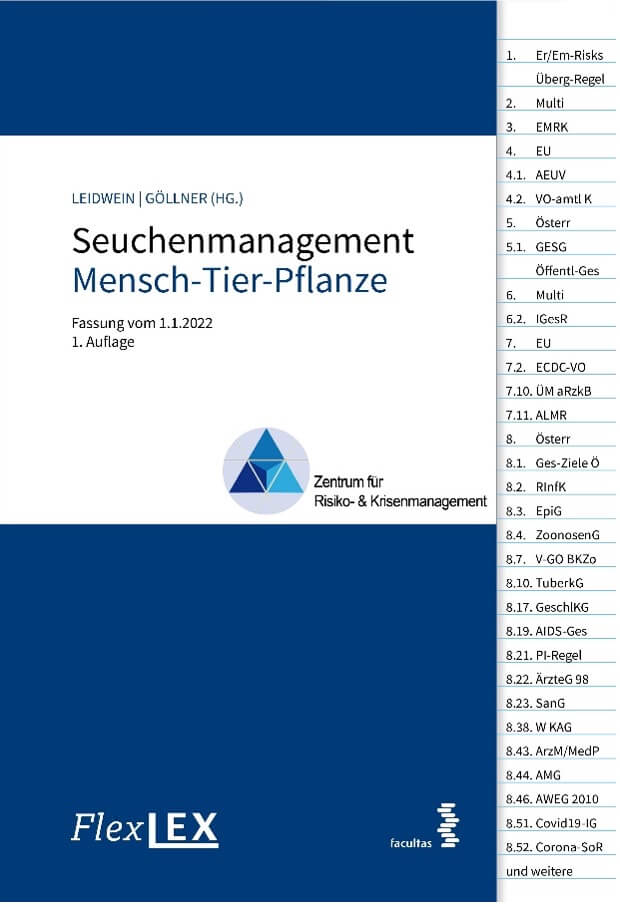
DISEASE MANAGEMENT
facultas / FlexLex, 2022
ISBN: 978-3-99071-189-7
Authors: Alois Leidwein, Johannes Göllner
Description
The FlexLex contains an up-to-date summary of all important national and international legal bases on the following topics
• Pandemics
• Epidemics
• Diseases
• Infectious diseases
• Crisis management
and offers an indispensable working aid for teaching and practice.
Further information and ordering under this link.
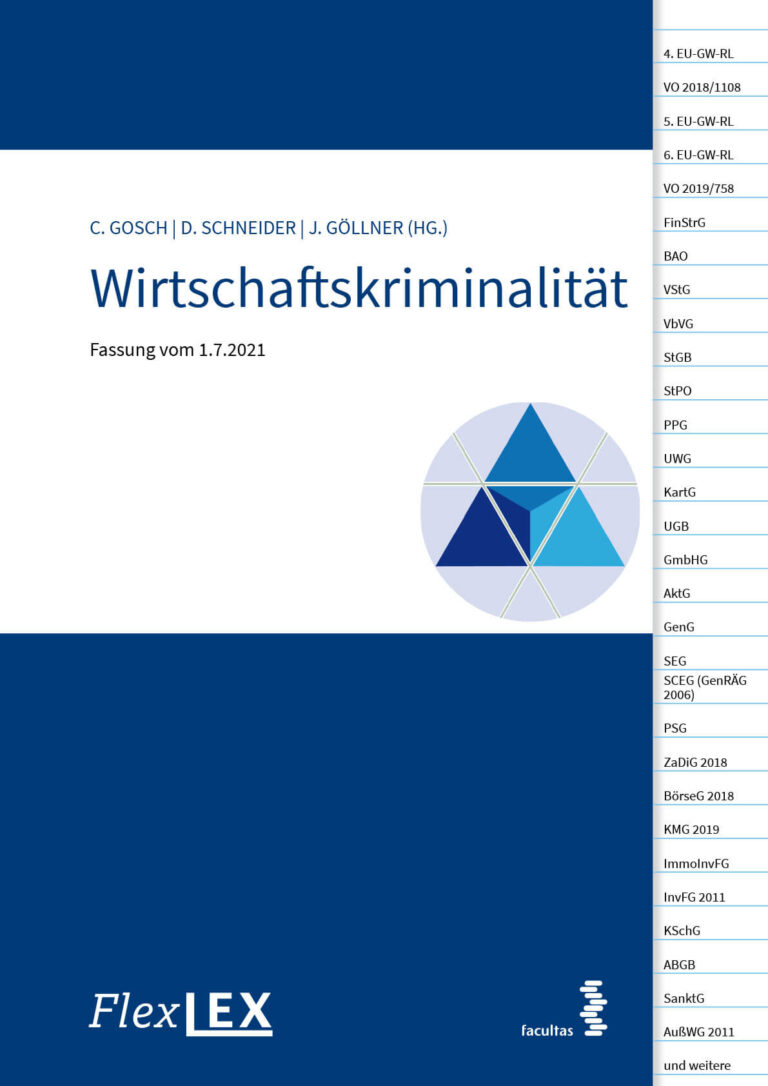
Financial Crime
facultas / FlexLex, 2021
ISBN: 978-3-99071-147-7
Authors: Christian Gosch, Daniela Schneider, Johannes Göllner
Description
This collection of laws is intended to provide an overview of the complexity of the topic of white-collar crime for all those involved in business life in Austria, both in practice and academia, as well as for students.
This collection of laws is subdivided as follows:
- Selected regulations and directives of the European Union
- Laws of the Republic of Austria
- Collection of links to international legal texts
- Appendix with international, European and Austrian directives and guidelines
More information
The collection of laws contains the following laws:
- Financial Crimes Act
- Federal Fiscal Code
- Administrative Offenses Act 1991
- Association Responsibility Act
- Criminal Code
- Code of Criminal Procedure 1975
- Product Piracy Act 2020
- Federal law against unfair competition 1984
- Cartel Act 2005
- Corporate Code
- Payment Services Act 2018 (excerpts)
- Stock Exchange Act 2018 (excerpts)
- Capital Market Act 2019 (excerpts)
- Real Estate Investment Funds Act (excerpts)
- Investment Funds Act 2011 (extracts)
- Consumer Protection Act (excerpts)
- Sanctions Act 2010
- Foreign Trade and Payments Act 2011
- Financial Market Money Laundering Act
- Beneficial Owners Register Act
- Account Register and Account Inspection Act
- Capital Outflow Reporting Act
- Trade Regulation Act 1994 (excerpts)
- Public Accounting Professions Act 2017 (excerpts)
- Accounting Act 2014 (excerpts)
- Customs Law Implementation Act (excerpts)
- Electronic Money Act 2010 (excerpts)
- International legal texts
and - 4, 5 i 6 EU-GWD
et al.
Further information and ordering under this link.
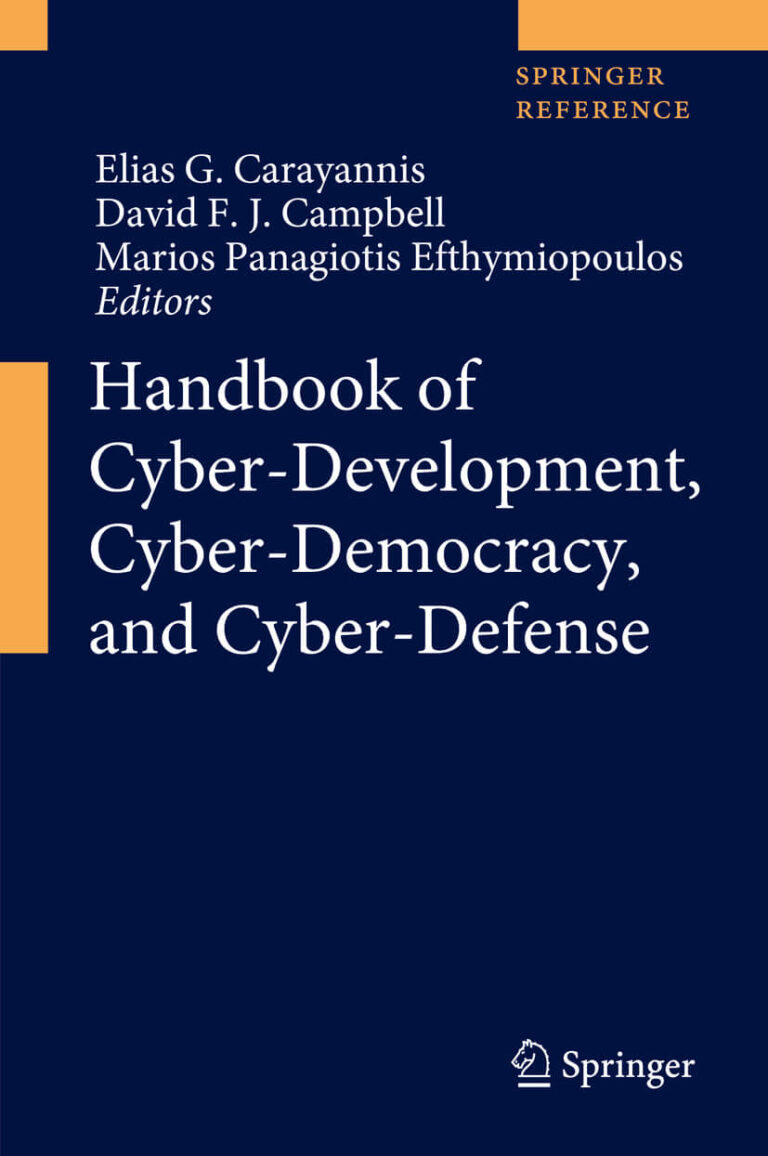
Handbook of Cyber Development, Cyber Democracy, and CYBER Defense
Springer International Publishing, 2018
ISBN: 978-3-319-09068-9
Authors: Elias G. Carayannis, David F. J. Campbell, Marios Panagiotis Efthymiopoulos
Description
This volume covers a wide range of issues related to economic and political development enabled by information and communication technology (ICT). Featuring contributions from researchers, industry leaders and policy makers, this handbook provides a comprehensive overview of the challenges and opportunities created by technological innovations that profoundly affect the dynamics of economic growth, the promotion of democratic principles and the protection of individual, national and regional rights. Of particular interest is the impact of ICTs on the generation and dissemination of knowledge, which in turn empowers citizens and accelerates change at all levels of society. Each essay includes literature reviews and key references; definition of critical terms and concepts; case studies; implications for practice, policy and theory; and discussion of future directions. The authors represent fields such as management, political science, economics, law, psychology, and education, and address contemporary issues such as health care, energy and environmental policy, banking and finance, disaster relief, investment in research and development, homeland security, and diplomacy in the context of ICTs and their economic, political, and social implications.
Contributions
- Contribution 1: Johannes GOELLNER, Global Supply Chain Network Risk Analysis and Monitoring for Global Cyber Defence. https://link.springer.com/referenceworkentry/10.1007/978-3-319-09069-6_33
- Contribution 2: Johannes GOELLNER, Cyber Documentation and Research Center Horizon Scanning Center for Cyber Analysis and Monitoring. https://link.springer.com/referenceworkentry/10.1007/978-3-319-09069-6_32
- Contribution 3: Johannes GOELLNER, Concept for Strategic Foresight Knowledge Development Framework for Horizon Scanning Center. https://link.springer.com/referenceworkentry/10.1007/978-3-319-09069-6_36
More information
Dr. Elias G. Carayannis is Full Professor of Science, Technology, Innovation and Entrepreneurship and Co-Founder and Co-Director of the Global and Entrepreneurial Finance Research Institute (GEFRI) and Director of Research on Science, Technology, Innovation and Entrepreneurship, European Union Research Center (EURC) at the School of Business, George Washington University in Washington, DC. Dr. Carayannis’ teaching and research activities focus on strategic government-university-industry R&D partnerships, technology roadmapping, technology transfer and commercialization, international science and technology policy, technology entrepreneurship, and regional economic development.
Dr. Marios-Panagiotis Efthymiopoulos is the founder and CEO of Strategy International, a non-profit think tank dedicated to global education, knowledge exchange and advice on political, economic and strategic issues. Dr. Efthymiopoulos has held various international, academic and professional positions, including at the Center for Transatlantic Relations, SAIS, Johns Hopkins University; George Washington University, Business School, EU Center of Excellence; Woodrow Wilson International Center for Scholars; and the Institute of Social and Political Sciences, University of Cyprus. A frequent invited speaker, he has consulted with organizations such as the Hellenic Homeland Security Police, the Joint War College of Greece, the NATO Maritime Interdiction Operation and Training Center (NMIOTC), the UN and NATO Training Corps, and the NATO Rapid Deployable Corps in Thessaloniki, Greece.
David F.J. Campbell holds appointments at the Faculty of Interdisciplinary Studies, Alpen-Adria University; the University of Applied Arts Vienna; and the Department of Political Science, University of Vienna, where his research interests include research funding, research evaluation, and science studies; comparative analyses of political systems in democracies and the interplay of politics and economics; supranationality; and empirical applications of systems theory and cybernetics. He has been a visiting scholar at the Department of Management Science at George Washington University; a research associate and lecturer at the Institute for Advanced Studies in Vienna; and a visiting scholar at the Department of Government at Georgetown University.
Further information and ordering under this link.





